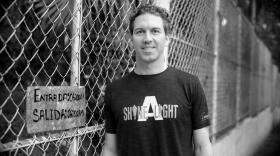“Now, every once in a while, I’ll have a quesadilla.”
Imagine being told you could no longer eat your mother’s cooking. That’s what it was like for Reynaldo Robledo when his personal trainer told him he had to swear off Roberto’s Taco Shop. An edict served with a side of irony: It happens to be the Mexican restaurant chain his parents started in San Diego in 1964. The trainer, Real Results Fitness owner Paul Rosenberg, had good reason to bar Robledo. His 46-year-old client was obese and on eight different medications for diabetes, high cholesterol and coronary artery disease — thanks largely to the lard in Roberto’s rich, traditional dishes. Having worked in the family business since age 12, Robledo grew up eating Roberto’s. Now owner of the franchise, he’s in at least one of the 43 Southern Nevada locations every day. Robledo knew he would never give it up. Turns out, he didn’t have to; his biggest problem was portion control. “I would sit down to a meal and eat a dozen tortillas,” he recalls. “I’d eat a loaf of bread in two days. I’d order a large pizza and 2-liter bottle of Coke and finish it by myself.” Robledo made huge strides simply by eating less, and replacing some fattening dishes with fruit and leaner meats. And then there are the strides on the treadmill. Early on, Rosenberg realized he was dealing with someone who needed extra motivation. “Rey had never exercised before,” the trainer says. “We did cardiovascular work where I would stand by him on the treadmill the whole time, just so I could get him accustomed to it.” Now, Robledo spends 12 solitary hours on the treadmill per week. It’s paid off. He’s shrunk from 343 to 212 pounds. He’s gone from 49.3 percent body fat to 19.5 percent. “I love the fact that I went from a size 48 pants to a 36,” Robledo says. But the real accomplishment is inside. He’s now off all medications, disease-free. His blood-sugar level has dropped from the 700s to the 70s — a rare feat, according to Joyce Molaskovitz, director of health and wellness services at Desert Springs Hospital. “Diabetes is a chronic illness,” she says. “If you don’t take care of it, you can’t get better.” Unlike those with type 1 diabetes (whose bodies don’t make insulin), people with type 2 have some choice in the matter. Don’t get him wrong. Robledo’s still a loyal Roberto’s customer. “I still eat at Roberto’s — I like to eat there. I cut down on lard, maybe 95 percent of it. I don’t eat fried tacos anymore. I don’t eat refried beans.” He’s just a more conscious customer. “Now, every once in a while, I’ll have a quesadilla ... I really love chicken. I have chicken every single day now.”










